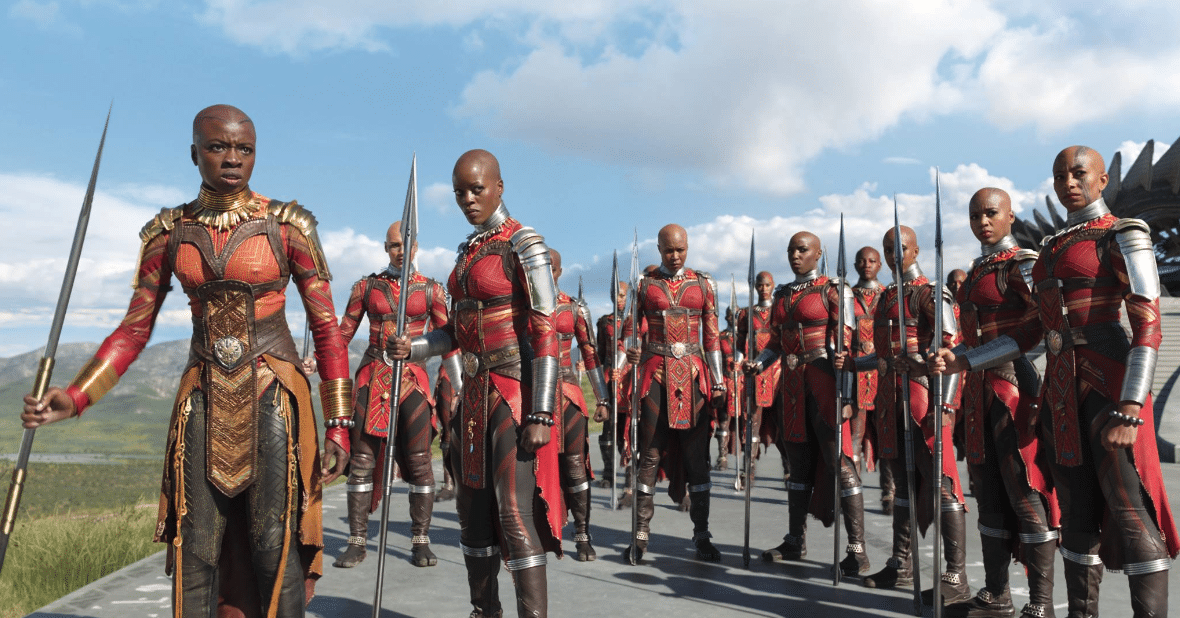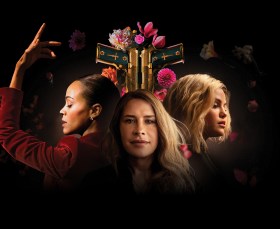It’s no surprise that Black Panther: Wakanda Forever steers heavily into the sense of loss surrounding the death of star Chadwick Boseman. The Marvel Cinematic Universe might span multiple films and television series each year but the first Black Panther stood out from the pack, and Boseman’s performance as King T’Challa was a huge part of that.
Returning director Ryan Coogler (working again with co-writer Joe Robert Cole) make his absence the centre of this sequel: without a protector, can Wakanda survive?
After an opening in which T’Challa is claimed (off camera) by an unknown disease while his tech genius sister Shuri (Letitia Wright) desperately battles to find a cure, his nation grieves. But the world moves on – and the world wants vibranium, the wonder mineral that gives Wakanda its super-technology.
With Wakanda seemingly having global supplies locked down, and T’Challa’s mother Queen Ramonda (Angela Bassett) in no mood to share, the USA is just one of the nations scouring Earth for it. When they find it under the Atlantic Ocean, the global power balance seems set to shift.
Read: Dangerous Liaisons on Stan review: it’s either love or war
Which it does, just not in the way they expected. In a sneak attack, the mining’s ship’s crew are killed, and while Wakanda is being blamed its royal family gets a secret visit from Namor (Tenoch Huerta), super-powered ruler of a reclusive underwater kingdom that also has vibranium.
He wants the US effort to find it quashed – and that means Wakanda has to find the person behind the only device that can track the magic mineral, prodigy Riri Williams (Dominique Thorne). Will they hand her over to be killed? Or will saving her put the two super-powers on the path to war?
Forever means forever
At more than two hours and thirty minutes, there’s definitely a ‘Wakanda Forever’ joke to be made. Whatever this film is, it isn’t a lean, mean storytelling machine, though the central spine is straightforward (it’s geopolitics in the Mighty Marvel Manner!). Coogler is in epic mode here and he never loses sight of the emotional journey multiple cast members are on either, but as they overlap it’s sometimes tricky keeping track of where everyone is at.
Throw in a number of side quests – Shuri is working on an artificial version of the flower that creates the Black Panther (having them all destroyed in the first film is an ongoing problem), there’s at least two different super-suits being built, both nations aren’t short on court intrigue, and Martin Freeman’s CIA agent is back in a completely pointless subplot (though it does provide for a few decent jokes) – and the big focus of this film is that the focus is kind of blurry.
An often moving story
Which is pretty much the point. This is an often moving story of a lot of characters with too much going on as they struggle to find focus after the death of the central figure in their lives. It’s exhausting for the characters and, for all the story’s high points, it can also make the film occasionally feel a little strained: whenever M’Baku (Winston Duke) is around, his refreshingly straightforward approach to things is a cool breeze blasting through the film.
Namor makes a powerful entrance here. The thoughtful but hard-hearted ruler is given plenty of space to establish his character and motivations, and both he and his underwater nation of Talokan (they have war whales!) make for enjoyably nuanced antagonists.
Much like Michael B. Jordan’s Killmonger in the first film, his reasons for what he does make sense: Wakanda has been acting unilaterally, not realising (or caring) that their actions might affect other nations. Plus he has little wings on his ankles that flap when he flies.
Read: Doctor Strange in the Multiverse of Madness review: nearly magic
Not all the new elements feel as fresh. Riri Williams should fit in – she’s ‘young, gifted and black’, as she herself puts it – but this is the second Marvel movie this year (after Doctor Strange and the Multiverse of Madness) to have a young woman as a mcguffin driving the plot (and pointing towards a possible TV spin-off). While she gets a bit more to do in the back half of the film, having two tech geniuses around is another element that muddies things a little.
Every weakness here is balanced by a strength. The big final battle is, as is often the case in Marvel movies, a somewhat uninspired clash between forces on a floating base (only here the base is floating on water not air); gripping performances by Wright and (especially) Bassett provide solid ground even when the story wavers.
Black Panther: Wakanda Forever may have loss and absence at its core, but it’s anything but hollow.
Black Panther: Wakanda Forever is in cinemas from 10 November.
Actors:
Director:
Format: Movie
Country:
Release:





